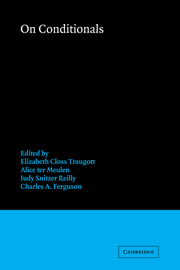Book contents
- Frontmatter
- Contents
- Contributors
- Preface
- Acknowledgments
- PART I GENERAL STUDIES
- PART II PARTICULAR STUDIES
- 5 ON THE INTERPRETATION OF ‘DONKEY’-SENTENCES
- 6 GENERIC INFORMATION, CONDITIONAL CONTEXTS AND CONSTRAINTS
- 7 DATA SEMANTICS AND THE PRAGMATICS OF INDICATIVE CONDITIONALS
- 8 REMARKS ON THE SEMANTICS AND PRAGMATICS OF CONDITIONALS
- 9 THE USE OF CONDITIONALS IN INDUCEMENTS AND DETERRENTS
- 10 CONDITIONALS AND SPEECH ACTS
- 11 CONSTRAINTS ON THE FORM AND MEANING OF THE PROTASIS
- 12 CONDITIONALS, CONCESSIVE CONDITIONALS AND CONCESSIVES: AREAS OF CONTRAST, OVERLAP AND NEUTRALIZATION
- 13 THE REALIS–IRREALIS CONTINUUM IN THE CLASSICAL GREEK CONDITIONAL
- 14 THE HISTORICAL DEVELOPMENT OF si-CLAUSES IN ROMANCE
- 15 FIRST STEPS IN ACQUIRING CONDITIONALS
- 16 THE ACQUISITION OF TEMPORALS AND CONDITIONALS
- 17 CONDITIONALS ARE DISCOURSE-BOUND
- 18 CONDITIONALS IN DISCOURSE: A TEXT-BASED STUDY FROM ENGLISH
- Index of names
- Index of languages
- Index of subjects
18 - CONDITIONALS IN DISCOURSE: A TEXT-BASED STUDY FROM ENGLISH
Published online by Cambridge University Press: 04 August 2010
- Frontmatter
- Contents
- Contributors
- Preface
- Acknowledgments
- PART I GENERAL STUDIES
- PART II PARTICULAR STUDIES
- 5 ON THE INTERPRETATION OF ‘DONKEY’-SENTENCES
- 6 GENERIC INFORMATION, CONDITIONAL CONTEXTS AND CONSTRAINTS
- 7 DATA SEMANTICS AND THE PRAGMATICS OF INDICATIVE CONDITIONALS
- 8 REMARKS ON THE SEMANTICS AND PRAGMATICS OF CONDITIONALS
- 9 THE USE OF CONDITIONALS IN INDUCEMENTS AND DETERRENTS
- 10 CONDITIONALS AND SPEECH ACTS
- 11 CONSTRAINTS ON THE FORM AND MEANING OF THE PROTASIS
- 12 CONDITIONALS, CONCESSIVE CONDITIONALS AND CONCESSIVES: AREAS OF CONTRAST, OVERLAP AND NEUTRALIZATION
- 13 THE REALIS–IRREALIS CONTINUUM IN THE CLASSICAL GREEK CONDITIONAL
- 14 THE HISTORICAL DEVELOPMENT OF si-CLAUSES IN ROMANCE
- 15 FIRST STEPS IN ACQUIRING CONDITIONALS
- 16 THE ACQUISITION OF TEMPORALS AND CONDITIONALS
- 17 CONDITIONALS ARE DISCOURSE-BOUND
- 18 CONDITIONALS IN DISCOURSE: A TEXT-BASED STUDY FROM ENGLISH
- Index of names
- Index of languages
- Index of subjects
Summary
Editors' note. The discourse function of conditionals is a major concern in virtually every paper in this volume. Ford and Thompson's contribution is, however, the only one which analyses actual, rather than constructed or experimental, data. It sets out to test Haiman's (1978) hypothesis that conditionals are topics, and to ascertain similarities and differences in the function of conditionals depending on clause order.
INTRODUCTION
The literature on natural language conditionals, including many of the contributions to this volume, has contributed much to our understanding of the internal structure of conditional sentences and of their ‘meanings’. What has been less well discussed is the discourse function of conditionals. Two grammars of English are exceptions: Modern English by Marcella Frank (1972) and The grammar book by Marianne Celce-Murcia and Diane Larsen-Freeman (1983), both of which begin to characterize conditionals with reference to their patterns of occurrence in discourse. Mead and Henderson (1983) also provide an enlightening discussion of conditionals in a particular context, looking at how they function in an economics textbook. Winter (1982) discusses some of the general factors involved in the positioning of various adverbial types, including conditionals. Linde looks at some of the factors which play a role in the positioning of if-clauses either before or after a main clause. Her basic finding is that, with the exception of certain irrealis if-clauses, the order of clauses does not ‘reverse the order of events in real time’ (Linde 1976: 280).
- Type
- Chapter
- Information
- On Conditionals , pp. 353 - 372Publisher: Cambridge University PressPrint publication year: 1986
- 44
- Cited by



